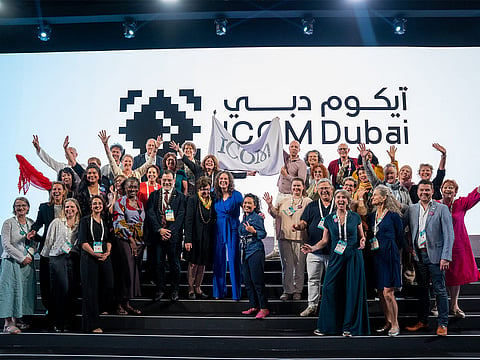ICOM Dubai 2025 puts museums at heart of global dialogue
World experts explore how cultural institutions adapt to fast-changing societies

Dubai recently staged the 27th General Conference of the International Council of Museums (ICOM Dubai 2025). Never before has this event taken place in the Middle East, Africa, or South Asia. Over 4,500 delegates — museum specialists, cultural policymakers, and decision-makers — arrived from across the globe. The gathering, operating under the theme ‘The Future of Museums in Rapidly Changing Communities,’ positioned Dubai as a focal point for cultural dialogue and creative interaction.
A comprehensive programme
The extensive schedule included upwards of 100 sessions, from panel debates and skills workshops to training courses. Each addressed how museums are adapting, how these institutions shape identity, and how they contribute to lasting social and economic growth.
Key figures and addresses
Sheikha Latifa bint Mohammed bin Rashid Al Maktoum, Chairperson of Dubai Culture, highlighted the concept of cultural diplomacy in her address. She pointed to unity in the UAE, framing it as not just a political foundation but also a cultural one. Her remarks reflected on how the success of one emirate can ripple outward, benefiting the nation and wider region, a sign of collective cultural advancement.
Noura bint Mohammed Al Kaabi, Minister of State, underscored themes of partnership and professional development. She described cultural diplomacy as a "lived practice" and referenced collaborations with UNESCO and ICCROM. Among her examples: a Baghdad initiative that trained upwards of 7,000 Iraqi professionals, supporting over 3,000 jobs. The aim — bring similar approaches to new settings, relying on both domestic and international partnerships.
Reem bint Ibrahim Al Hashimy, Minister of State for International Cooperation and CEO of Expo City Dubai Authority, spoke during ‘The Power of Narrative, Heritage, and Youth’ session. She underscored museums’ capacity to spark dialogue and encourage cross-cultural understanding, advocating for young people to play a more prominent part in museum work.
Exploring cultural and historical contexts
A keynote by Zaki Anwar Nusseibeh, Cultural Adviser to the UAE President, focused on museums as active players in change. He stated, "Museums face challenges centred on preserving the essence of human creativity while simultaneously responding to its continuous evolution. We must not forget that museums are not merely observers of change but active participants in it. They mirror the societies they serve, reflect our histories, raise questions about our present, and open pathways of imagination toward our future."
Expanding on this, he outlined the UAE’s approach to cultural stewardship: "The UAE has long understood that culture is the soul of the nation. Guided by our leadership’s vision, we have built a framework that ensures our museums remain vessels of memory and platforms for innovation. Our legislation protects both tangible and intangible heritage. The ‘Cultural Agenda 2031’ and the ‘National Strategy for Cultural and Creative Industries’ affirm the central role of museums in strengthening national identity and advancing the creative economy."
Mohammed Khalifa Al Mubarak, Chairman of the Department of Culture and Tourism – Abu Dhabi, drew attention to how museums influence society. "In the UAE, we believe in the growing role and value of museums. We have built a museum ecosystem that is ambitious, comprehensive, and authentic, driven by our conviction that museums are not mere repositories of objects, but essential infrastructure for culture, deep understanding, and a sense of belonging. Museums constantly remind us that identity and innovation are not opposites; they grow together."
Concluding visions and future endeavours
Sessions ranged in focus. Highlights included ‘Museums After Conflict: Creating Spaces for Recovery’ and ‘Challenging the Familiar: Reimagining Museums’, with perspectives from Uzbekistan, Saudi Arabia, Zambia, and Italy. Lisa Sasaki of the Smithsonian Institution delivered the S. Weil Memorial Lecture, examining the importance of prioritising visitor engagement and safeguarding public confidence.
Closing proceedings saw Antonio Rodriguez named ICOM President, with Nasir Al Darmaki as Vice President, and Mohammed Saad Al Rumaihi leading ICOM Arab. Rotterdam was confirmed as the next host for the 28th ICOM General Conference in 2028; the ceremonial transfer of the ICOM flag marked the handover. The conference also introduced the ICOM Sustainability Award, recognising Kaye Hall and Jamie Brown for advancements in sustainable museum practice.
The event provided an unprecedented platform for exchange, learning, and collaboration across the global museum community.
Sign up for the Daily Briefing
Get the latest news and updates straight to your inbox



